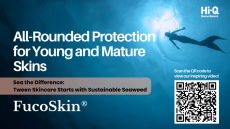New study reveals ingredient combination set to combat anti-ageing
could send anti-ageing skin care manufacturers into a spin, with
the claim it reduces facial wrinkles in Asian consumers by nearly
50 per cent.
Senetek, a life sciences product development company sponsored by cosmetics manufacturers Panion & Biotech, carried out the clinical study at the National Taiwan University Hospital, on male and female volunteers in search of a combination of ingredients that could aid wrinkles in the Asian consumer.
It concluded that a combination of kinetin, a powerful anti-oxidant, and niacinimide, a B complex vitamin, could drastically reduce the affects of facial wrinkles in Asians.
Anti-ageing treatments have seen an unprecedented demand from increasingly image conscious consumers, predominately the lucrative baby boomer generation who are seeking younger looking skin. These new findings could well prove lucrative for skin care manufacturers who may choose to capitalise on the gap in the market for the niche Asian consumer.
91 per cent of the 52 volunteers who took part in the trial were female, aged between 30 and 60 years old.
Volunteers were separated into two parallel treatment groups with the first receiving a topical application of both ingredients to one side of the face, and a control serum containing no active ingredients to the other.
In order to fully verify the affects of the ingredients together, the second group received an application of just niacinimide to one side of the face, and again, a control serum containing no active ingredients to the other.
Over the course of the 12 weeks the volunteers were studied at regular intervals for signs of changes in facial spots, pore count, wrinkle count and skin evenness. They were also assessed with non-invasive probes to physically measure skin elasticity, skin moisture content and skin melanin and erythema.
The results of the trial has led attending dermatologist, Pin-Chi Chiu, to suggest that '. Study data suggest that the compounds kinetin and niacinimide have the capacity to exert multiactive, multifunctional and pluripotent effects on the skin when used together.'
According to the company, the results of the test will further expand Panion's dominance in the Asian skin care market and consolidate it as an industry leader.
Michael Chiang, Executive President of Panion & BF Biotech, stated, "With a growing trend of Asian consumers becoming more concerned about skin health and appearance, Panion will launch this clinically proven line of Kinetin combination products to dermatologists and plastic surgeons in Taiwan and expand to Mainland China."
According to the Kline Group, growth of skin care products in China during the period 1999 to 2003 was a modest 9.8 per cent.
A lot of this market growth came from the premium end of the market, which was the first to really develop in China. However, as wealth is now starting to filter down to greater numbers of China's estimated 1.3 billion population, it seems that even richer pickings could be in sight at the lower end of the market.















